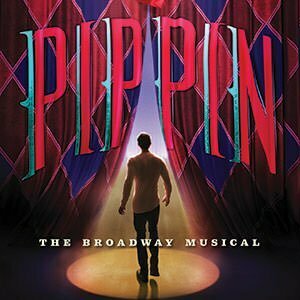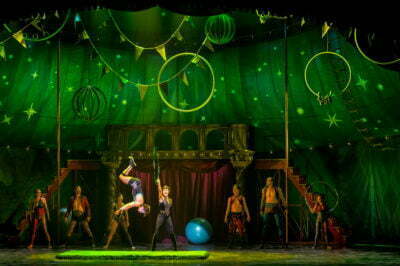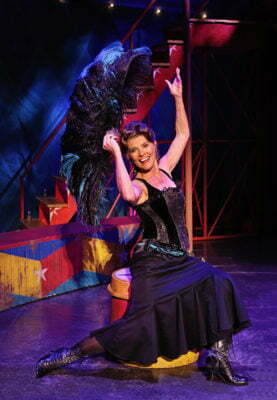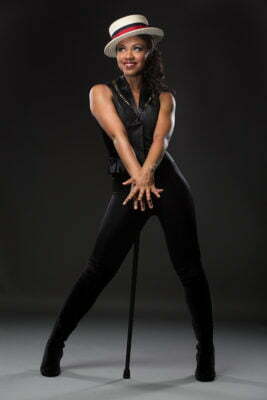Pippin
Book by Roger O. Hirson
Music and Lyrics by Stephen Schwartz
Directed by Diane Paulus
Produced by Broadway in Chicago
At The Palace Theatre, Chicago
An Enticing Circus Spectacle
As a show about the seductiveness of glamor and theatricality, Pippin can’t skimp on design and technical aspects. Thankfully, the producers of the touring version, now in Chicago for too brief a run at the Cadillac Palace Theatre, understood that. Based on the 2013 revival of the 1972 musical by Stephen Schwartz and Roger Hirson, this production has some of the most beautiful costumes, make-up, wigs, and props I’ve seen at Broadway in Chicago’s theatres, all under a big-top tent. And it’s no wonder that costume designer Dominique Lemieux and scenic designer Scott Pask both have Cirque du Soleil credits, since the show takes the form of a circus, with about fourteen acrobats, clowns, and dancers aiding the main characters in making a story about learning to accept your limitations and the darkness of the world into a night of thrills and laughs.

The first act is ostensibly about how the Frankish prince Pippin (Sam Lips) returned home after college to the court of his father, the Holy Roman Emperor Charlemagne (John Rubinstein, who originated the role of Pippin), in search of his own greatness. The royal family is introduced to us by the Leading Player (Sasha Allen), whose posse step in to play soldiers, peasants, and whatever else is required for a scene. At first, Pippin considers joining his father and step-brother on their military campaigns, but is disgusted and by war after a conversation with a droll severed head. Upon the advice of his grandmother (Adrienne Barbeau), he participates in a bondage themed orgy, but finds that unsatisfying as well. Eventually, he finds a purpose in lending his support to an uprising against his father.
That doesn’t stick either, though, and after intermission, Pippin turns from a Verdi’s Don Carlo to an Ibsen’s Peer Gynt-like character, forever changing his goals because there isn’t anything he truly cares about. The Leading Player promised his life would he exciting and important, but when he does get his chance to wield power, he abandons it because it comes with responsibility and danger. Later, a widow, Catherine (Kristine Reese), who, like all the other characters, is also one of the players, recognizes that if she can rouse Pippin out of his depression, she’ll have a handsome new husband and somebody to do the physical labor on her farm for her. But Pippin never imagined himself doing anything so mundane, and after trying work for the first time in his life, finds he does not like it.

The orchestra, conducted by Ryan Cantwell, keeps up an alternating peppy and dramatic sound as they play Stephen Schwartz’s brass and woodwind-infused score. Truthfully, only the Act I finale “Morning Glow” and the audience sing-a-long “No Time at All” are easily hummable, but that’s partly because a lot of the other numbers, like “Glory” are extended over long scenes where the focus is mainly on movement. That said, the actors all convey the emotional state their songs are meant to inspire. Katherine Reese’s “I Guess I’ll Miss the Man” is melancholy from here awareness of how lousy a prize she’s fighting for, and the Leading Player and Pippin’s “On the Right Track” is jaunty, and in the situation, absurd. But the most memorable is Adrienne Barbeau as Pippin’s grandmother Berthe, belting “No Time at All” while dangling upside down while held by a man on a trapeze.
Pippin has a cynical sense of humor, and a large part of that is due to the protagonist’s aloof attitude. Sam Lips interprets the character as a feckless jerk most of the time, except for the occasional tantrum or episode of depression, but still keeps him appealing, because everyone else deserves him. John Rubinstein is a buffoonish Charlemagne, but one who at least has the sense to be embarrassed by Pippin’s behavior. Sabrina Harper and Erik Altemus play his wife and younger son, Fastrada and Lewis, as cartoonish villains in love with their own egos, and Sasha Allen is a commanding and inspiring Leading Player who turns downright vicious late in the play. What all the actors have in common, besides their excellent movement skill, is great comedic talent. This includes the chorus, who clamber over each other in everything from fetish gear to barnyard animal costumes, and have an easy chemistry with each other and the named characters. Even Reese, whose Catherine is the most sympathetic character, is hilariously self-depreciating, especially during her more selfish moments.

What really makes director Diane Paulus’s Pippin stand out is its control of energy. There are almost always a lot of interesting things happening onstage, from human jump ropes, to people flipping through hula hoops, to Chet Walker’s Fosse-inspired choreography, but it seldom feels overwhelming or interminable. Sure, the play’s message that you shouldn’t let superficial excitement distract you from the dirt and compromises that make up real life is a little disjointed from the first act and doesn’t quite land an emotional punch, but the journey there is a tribute to the theatre’s visual power. There is just enough irony and self-awareness in Hirson’s script to make the hero-finding-himself story palatable, and plenty of laughs throughout. Hurry to the Palace; its size makes it the perfect venue for a production this big.
Recommended
Jacob Davis
[email protected]
Reviewed July 29, 2015
For more information, see Pippin’s page on Theatre in Chicago.
Playing at the Cadillac Palace Theatre, 151 W Randolph St, Chicago. Tickets are $27-105; to order, call 800-775-2000 or visit BroadwayinChicago.com. Performances are Tuesdays-Fridays at 7:30 pm, Saturdays at 2:00 pm and 8:00 pm, and Sundays at 2:00 pm and 7:30 pm through August 9. Running time is two and a half hours with one intermission.
